#all eyes on wet’suwet’en
Text
Demonstrators gathered in 40 locations across Canada on Saturday to voice their opposition to the Royal Bank of Canada's funding of fossil fuel projects.
The protests, part of a nation-wide effort dubbed Fossil Fools Day, unfolded in cities including Edmonton, Toronto, Ottawa, Winnipeg, Halifax and Vancouver.
One protestor said the demonstrations were intended to raise awareness of the bank's looming Annual General Meeting, scheduled to take place in Saskatoon on April 5.
Full article
Tagging: @politicsofcanada
#cdnpoli#canadian politics#canadian news#canadian#canada#RBC#royal bank of canada#fossil fuels#oil#wet'suwet'en#wet’suwet’en strong#all eyes on wet’suwet’en#protests#land defenders#land defense
238 notes
·
View notes
Text
“Remember my face,” Sii-am Hamilton told the crowd gathered on Finnieston Street near the high fencing that surrounds the Cop26 summit on Tuesday morning. “Remember because it’s not if, it’s when you will go missing, if you are involved in land rights.”
The rally for murdered and missing indigenous women, girls and two-spirit people heard a painful litany of lost loved ones from witnesses from Alaska to the Amazon, and the legacy of their absence for families and communities.
“Say their names,” said Delee Nikal, a Wet’suwet’en activist. “Do not forgot our sisters who have been stolen.” Like her fellow speakers, she was explicit: “The femicide is directly linked to the ecocide … there needs to be more awareness that these extractive industries, all that is affecting our climate and destroying our territories, is intertwined with violence against our women and girls.”
In Canada, Indigenous women and girls are targeted for violence more than any other group, and are 12 times more likely to go missing or be killed. In the US, the justice department found that Native American women faced murder rates more than 10 times the national average.
But this abuse does not happen free of context: in 2019, Canada’s national inquiry into missing and murdered Indigenous women and girls accepted the link between “boomtown” and “man camp” environments that emerged around resource extraction projects and violence against Indigenous women and girls, as well as increased sex industry activities in those areas.
And still this has yet to translate into genuine recognition by the leaders at the UN summit or indeed the wider environmental movement, Hamilton, from British Columbia, said after the rally. “At larger international events like this one and even at home, I don’t think that people understand just how dangerous the lives of Indigenous women have gotten. Our conversations shift towards catchy phrases like ‘net zero’ or ‘1.5’, which don’t represent just how violent the experience of growing up in an extractive world has become.”
The fear Hamilton expressed at the rally was, she said, “really natural”. Over the past year she has been involved in direct activism at Fairy Creek, protesting against the logging of old-growth forest in southern Vancouver Island. “And this year alone I’ve watched so much violence, towards specifically young Indigenous women and girls, at the hands of the police. I’ve watched so many people have their bones broken, their hair ripped out, their eyes gouged.”
She said articulating and sharing these struggles with women from different countries and communities could be at once reassuring and devastating. “It makes you feel less isolated when you’re meeting so many other people who are experiencing similar forms of violence. No matter what kind of extractive industry is attacking a community, it has same rippling effect on women.”
She added: “It makes you feel less lonely, but at the same time it creates this different type of rage that I really can’t describe – knowing that there are so many women missing, it’s not just in Canada, and it’s not just in Mexico, it’s all over the world. Wherever you find people that are struggling for the land, you will find missing women.”
#cop26 summit#missing and murdered indigenous women#violence towards women is linked to violence towards the land
180 notes
·
View notes
Text
A friend of mine and I have been chatting lately about how this pandemic seems to be opening many Canadians eyes to the problems in our country and world (as horrific as it is that it’s taken a pandemic to do so). Of course no one wanted or predicted a pandemic and I certainly do not believe it is a GOOD thing, it’s a horrifying and terrifying thing. But as many have said before me, it’s truly illuminating the problems in our country:
The lack of money and essentials given to Indigenous and First Nations communities in this pandemic is appalling. $305 million of the $82 billion pandemic response budget was given to ALL Indigenous and First Nations communities, highlighting and drawing mass attention to Canada’s historic and continued mistreatment. Furthermore, gas pipelines are continuing to be run through Indigenous and First Nations land- despite the increased risk of exposure to COVID-19 and the continual protests.
The Spirit of the Buffalo Camp at Standing Rock was burned down the morning of April 26th, 2020. Local RCMP and law enforcement did nothing. “The camp is a prayer camp in resistance to Enbridge’s Line 3 Pipeline expansion (the corporations biggest ever project) and is [situated] almost directly on the US/Canada border.” The camp had stood for 2 years in peaceful resistance to the pipeline expansion. Their camps facebook page. The Wet’suwet’en resistance blockade against Coastal GasLink and LNG Canada placing a pipeline across unceded land is still on going. They are facing RCMP working in the direct interests of gas companies. Donate here.
The CERB initially excluded a massive one-third of Canadians- and the most vulnerable and in need third too. The initial CERB qualifications released on March 25, 2020 was met with calls for it to be universal. Initially, it excluded students, seasonal workers, homeless people, disabled people, gig, contract, and commission workers, and those who were making scant part-time income. Push back by citizens and fuelled by NDP leader Jagmeet Singh led to Trudeau expanding the restrictions to include contract workers, seasonal workers, and those still making up to $1000. On April, 22, 2020, Trudeau also announced the CESB, a $9.3 billion support package for students and recent graduates. Although students will only recieve $1,250 per month ($1,750 if disabled), and this amount faces backlash as rent in places such as Ontario is at least $900/month. Canadian students are not worth 60% of other Canadians. Jagmeet Singh and the NDP party are still pushing for the CERB to be made universal and all qualifications to be waived.
Trudeau refuses to exclude companies who use tax havens in their COVID-19 bailout.
----------
A few accounts I would recommend following if you want to stay informed:
- @allthecanadianpolitics (my favourite blog tbh), @atlanticcanada, @politicsofcanada, and your provincial politics tumblr ie. (@abpolitics, @nlpolitics)
- Raven Trust on Instagram and their website
- Women on the Frontlines Speak on Instagram
- Gidimten checkpoint on Instagram
- tapioca-starch on Instagram
(April 27, 2020)
#b rambles#politics#poli#cdnpoli#cdnpolitics#cerb#cesb#covid19#indigenous#first nations#wetsuwetenstrong#wetsuweten solidarity#standing rock#pipelines#oil#jagmeet singh#trudeaumustgo#ndp#students#spirit of the buffalo camp#gidimten#og post#my writing
281 notes
·
View notes
Photo
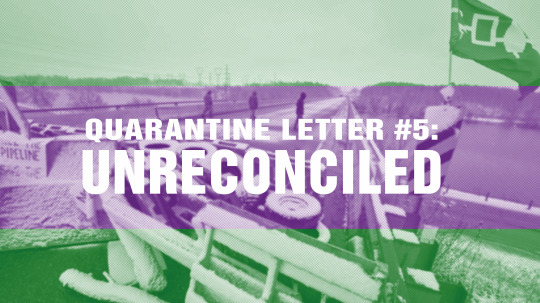
QUARANTINE LETTER #5: UNRECONCILED
Ron Sakolsky
Stop blaming me, accusing me, stalking me. Working yourselves into an anti-viral paralysis. All of that is childish. Let me propose a different perspective. See me as your savior instead of your gravedigger. You’re free not to believe me, but I have come to shut down the machine whose emergency brake you couldn’t find. I have come in order to suspend the operation that held you hostage. I have come in order to demonstrate the aberration that normality constitutes. Ask yourselves how you could find it so comfortable to let yourselves be governed. Don’t let those who’ve led you to the abyss claim to be saving you from it: they will prepare for you a more perfect hell, an even deeper grave. Thanks to me for an indefinite time you will no longer work, your kids won’t go to school, and yet it will be the opposite of a vacation. Vacations are the space that must be filled up at all costs while waiting for the obligatory return to work. I render you idle. Use the time I’m giving you to envision the world of the aftermath in light of what you’ve learned from the collapse that’s underway. The disaster ends when the economy ends. The economy is the devastation.
from “What the Virus Said”
Just when I was feeling most elated about prospects for the future given the strength of the Indigenous resistance sweeping Canada in early 2020, the coronavirus arrived on the scene with whiplash-inducing force to upstage everything in its deadly path unexpectedly shutting down whatever parts of the Canadian economy had not already been intentionally shut down by the Wet’suwet’en land defenders and those involved in solidarity actions that had immediately preceded the spread of the disease. Rather than framing The Virus exclusively within the kind of nightmare scenario that is typically associated with the mainstreaming of the term “surreal” (as if all there ever is to surrealism’s critique of reality is this dark side), I want to instead illuminate the surreal possibilities for social transformation that can be revealed by creating a surreal (rather than literal) analogy between the contagion of the virus and the contagion of revolt.
Starting in February of this year the appearance of a widespread Indigenous uprising on the stage of Canadian history swiftly moved the realm of the surreal from dreams of radical transformation to the direct action undertaken to bring it about. Railways, highways and ferries were blockaded, provincial legislatures, government administrative offices, banks and corporate headquarters were occupied. For many inconvenienced Canadians, such actions as these were considered to be unacceptable even though they would prove to be only a fraction as disruptive as the more authoritarian forms of state control that would later shelter under the legitimacy of saving us from The Virus.
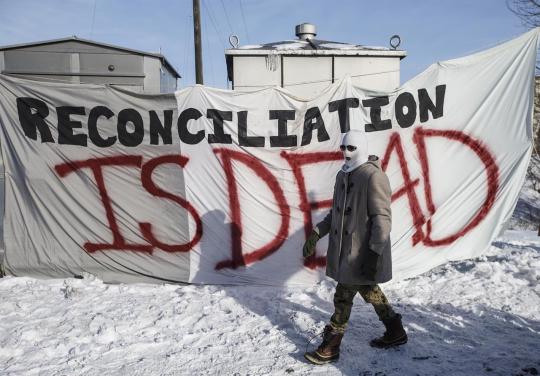
Though the immediacy of the COVID-19 pandemic would quickly overshadow the earlier Indigenous revolt in the public eye, it is now evident to many that the smiley-faced mask of Canadian colonialism has been pulled off to reveal a state that in spite of its professed human rights and climate change awareness rhetoric continues to have no compunctions about invading Indigenous territory without consent to build pipelines for fracked natural gas and tar sands oil because of what it considers to be in the best interests of the almighty economy. As Tawinikay (aka Southern Wind Woman) has written, “If only one thing has brought me joy in the last few weeks, it began when the matriarchs at Unist’ot’en burned the Canadian flag and declared reconciliation dead. Like wildfire, it swept through the hearts of youth across the territories. Out of their mouths, with teeth bared, they echoed back: reconciliation is dead! reconciliation is dead! Reconciliation was a distraction, a way for them to dangle a carrot in front of us and trick us into behaving. Do we not have a right to the land stolen from our ancestors? It’s time to shut everything the fuck down”.
Just as Indigenous peoples have demanded their land back in rural areas while pronouncing the false hope of government-brokered reconciliation to be dead, the systemic dislocations to the economy brought on by the coronavirus have led urban anarchists to address fundamental land issues by calling for rent strikes. But why stop there? In response to the devastation associated with The Virus, we have heard calls for the cessation of not only rent, but mortgage and utility payments, even the cancellation of debt itself, the end of wage slavery, and demands for the cessation of arrests for minor offenses, the release of prisoners who have committed non-violent crimes, or flat-out prison abolition. As surrealists we might ask ourselves what other noxious aspects of reality might be called into question and transformed by beginning to imagine what might exist in their place.
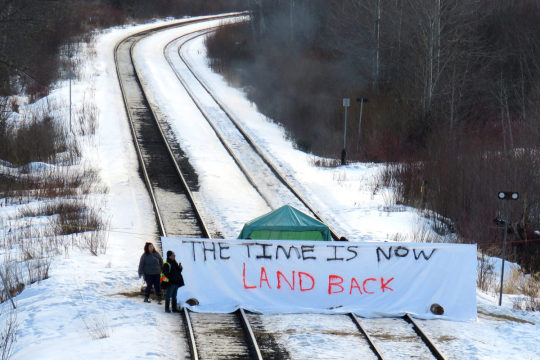
Where I live in British Columbia, resource extraction has always been the name of the game, but the emergence this year of a widespread oppositional network ranging from “land back” Indigenous warriors to elder traditionalists and from Extinction Rebellion activists to anarchist insurrectionaries has been heartening. Together, this multi-pronged force disrupted business as usual in solidarity with Unist’ot’en and Wet’suwet’en land defenders, and threatened to bring the Canadian economy to a grinding halt. This time growing numbers of Indigenous peoples were not willing to be bought off by corporate bribes or mollified by a legal system that has never done anything but pacify, brutalize, or betray them in the process of stealing their land. This time people fought back in droves against the forces of colonial law and order. This time the air was alive with a spirit of refusal and rebellion with one action building upon another in a burgeoning movement that could not be stopped. When one railroad blockade would be busted by the Royal Canadian Mounted Police (RCMP), another would spring up in its place elsewhere extending the frontlines of the battle all across the continent.
As I write, the wheel of change is still in spin. What the final outcome will be in relation to either the COVID-19 virus or the virus of revolt is unknown, especially in relation to the predatory nature of the times in which we live where the emphasis is often placed on the institution of statist forms of social control rather than grass roots mutual aid efforts in relation to the immanence of societal upheaval. Even though the pandemic has supposedly shut down the provincial economy with lightning speed, Coastal Gas Link’s pipeline construction efforts with their invasive industrial “man-camps” have still been allowed to continue to exist on unceded Wet’suwet’en territory with RCMP logistical support, thereby callously endangering the health and safety of the Indigenous inhabitants. It's abundantly clear whose lives matter to the Canadian government and whose don’t. Consequently, it will remain very hard for the authorities to put the genie of Indigenous rebellion back in the colonial bottle in the future. In the meantime, we are mourning what of value we’ve lost from the past, celebrating what we’ve created in the present, and still demanding the impossible.

31 notes
·
View notes
Photo
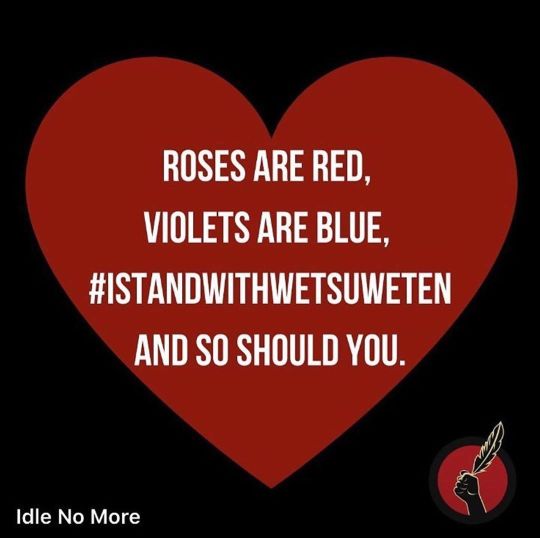
ALL EYES ON WET’SUWET’EN!! SOLIDARITY WITH WET’SUWET’EN! #istandwithwetsuweten [ Post via @riseindigenous . Image by @alexwassenas ] https://www.instagram.com/p/B8jowkhF_Qz/?igshid=e5a091dvt7tk
28 notes
·
View notes
Text
On Current Events
Update: Calgarians can find a template to write to their representatives about repealing Bill 1 barring the right to protest on whatever the government deems “essental infrastructure” here!
Hi everyone. This blog has never been one to shy away from politics but I also understand and respect the need to take refuge in online spaces, and I don’t intend to clutter this blog with my political musings (more than there already is, at least) and with reblogs.
For that, I’d direct you to my personal blog @hyperboreanhapocanthosaurus and particularly the yeah y yeah alberta tag. I would also recommend following or checking regularly on tumblr blogs All the Canadian Politics, ABPoli, and The Quotable Alberta Hansard if you are interested in seeing more Canadian and Albertan political content. I don’t feel it’s my place here to do the work that these great resources are already doing.
Many of us are already aware that these are not solely American issues and that these events are being reflected across Canada, including at home in Alberta where the government recently pushed through legislation to ban protesting on “essential infrastructure”. This includes both public and private property and leaves ample room for the government to decide arbitrarily to criminalize protests that criticize them or the energy sector. It was created in the wake of railway protests across Canada in solidarity with the Wet’suwet’en, but it is just as likely to apply to currently planned BLM protests in the province. This is unconstitutional and will not stand, but it has now been enacted and it is unknown how long it will stay in place. If you choose to join a protest in the province, please be aware of this and keep yourself safe.
Finally, if you are sitting at home frustrated and wanting to take action but not sure where to start, I recommend reading this article from the Progress Report on defunding police in Edmonton and Calgary. As far as I am aware there is not a template for Calgary yet, but you will find a link to a template to send to Mayor Don Iveson and your city councillor about reallocating city funds towards mental health services and supporting our community, particularly urgently our black and indigenous community members. Albertans, please keep an eye out on the above resources for opportunities to support your own local community. Canadians and Non-Canadians, please remember that police violence against marginalized communities is not simply a US problem even if it manifests differently here; you help most when you acknowledge these realities and actively fight against them.
Thanks guys, stay safe
4 notes
·
View notes
Link
Unceded and sovereign Wet’suwet’en land is under attack. On December 31, 2019, BC Supreme Court Justice Marguerite Church granted an injunction against members of the Wet’suwet’en nation who have been stewarding and protecting our traditional territories from the destruction of multiple pipelines, including Coastal GasLink’s (CGL) liquified natural gas (LNG) pipeline.
We call for solidarity actions from Indigenous and non-Indigenous communities worldwide who uphold Indigenous sovereignty and recognize the urgency of stopping resource extraction projects that threaten the lives of future generations.
International Call for Week of Solidarity! Facebook event page
TWELVE SOLIDARITY ACTIONS so far:
- CALGARY on Fri Jan 10: https://www.facebook.com/events/632565517548915/
- EDMONTON on Fri Jan 10: https://facebook.com/events/s/solidarity-with-wetsuweten-ami/529608887646854/?ti=ia
- MONTREAL on Thurs Jan 9: https://facebook.com/events/s/wetsuweten-call-to-solidarity-/462322297747589/?ti=ia
- MONTREAL on Sun Jan 12: Fundraiser https://www.eventbrite.com/e/restoring-sovereignty-somatics-for-boundary-repair-online-tickets-85685769443
- ROCHESTER, NY on Sat Jan 11: https://www.facebook.com/events/1502629836568193/
- TORONTO on Tues Jan 7: https://www.facebook.com/events/2235129013457777/
- SASKATOON on Fri Jan 10: https://www.facebook.com/events/786501005150533/permalink/786502895150344/
- SMITHERS (Wet’suwet’en/Gidimt’en Territories) on Jan 10: https://facebook.com/events/s/solidarity-rally-for-wetsuwete/1311168885721762/?ti=ia
- VANCOUVER on Wed Jan 8: https://www.facebook.com/events/1041966289487333/
- VANCOUVER on Sat Jan 11: https://www.facebook.com/events/2503683759899313/
- VICTORIA on Tues Jan 7: https://www.facebook.com/events/1823715671269318/
- VICTORIA on Sat Jan 11: https://www.facebook.com/events/544890622907015/
ORGANIZE ONE IN YOUR COMMUNITY AND EMAIL US at [email protected]. List will be updated daily.
5 notes
·
View notes
Video
All Eyes on Wet’suwet’en - Week of Solidarity.
Since that week of solidarity in January...
RCMP are raiding Wet’suwet’en Land Defender Camps to build yet another fucking pipeline. This is happening now, Feb. 6, 2020. Another article from CBC.
Donate to Unist’ot’en Camp
Donate to defenders of the Gidimt’en Access Point
Wet’suwet’en Strong Facebook page
3 notes
·
View notes
Text
Hamilton, ON: “RCMP Off Wet’suwet’en Land”
Northshore Counter Info | It's Going Down | February 5th 2019
The post Hamilton, ON: “RCMP Off Wet’suwet’en Land” appeared first on It's Going Down.
The following communique was originally posted to North-Shore Counter-Info. Late last night as many had their eyes glued to screens cheering on the Patriots in the Superbowl, a small crew of pals got busy taking on one symbol of so-called Canada’s nationalism: the RCMP. Within just minutes a handful of determined folks had destroyed all […]
→ READ MORE ←
Get your Latest News From The Leftist Front on LeftPress.News
→ Support Us On Patreon! ←
#Action#Anarchist Movement#Communique#Ontario#Hamilton#ON: “RCMP Off Wet’suwet’en Land”#It's Going Down#February 5th 2019
3 notes
·
View notes
Text
The RCMP denies it conspired with a natural gas pipeline builder and a private security firm in a campaign designed to harass Wet'suwet'en people off their unceded territory in northern British Columbia, court filings say.
The RCMP, Coastal GasLink and Forsythe Security, named as defendants in a lawsuit three Wet'suwet'en members launched last June, all deny the allegations.
The $6.6-billion Coastal GasLink pipeline project is designed to carry fracked natural gas to a $40-billion LNG terminal in Kitimat, B.C., for export to Asia. Wet'suwet'en hereditary chiefs say Coastal GasLink does not have consent to cross their territory.
The latest defence filing to the lawsuit comes from B.C.'s public safety minister, the provincial politician in charge of policing, who is being represented by a Justice Canada lawyer because the claim involves the Mounties.
The minister's 17-page response, filed after a months-long delay, says the RCMP acted "reasonably" and within the bounds of a court-ordered injunction prohibiting interference with the project.
Police increased enforcement after an "escalation of unlawful activity" that included a violent February 2022 incident involving mask-wearing, axe-wielding assailants at a pipeline construction site, the filing says. [...]
Continue Reading.
Tagging: @politicsofcanada
#cdnpoli#Indigenous persecution#Wet'suwet'en#Wet'suwet'en Strong#all eyes on wet’suwet’en#RCMP#police brutality#genocide tw#colonization#Coastal GasLink#British Columbia
73 notes
·
View notes
Text
Parasite and Eco-justice: a reflective essay

Parasite is one of my favourite movies and I’ve re-watched it several times since its’ release. Not only because of the suspense, the genius way the Kim family worms their way into being employed by the Park’s, or the strong commentary on the exploitation of the working class in a capitalist society. This movie made me think deeply about the connections between environmentalism and humanitarianism.

In the latter half of the movie, there is a striking scene where the Kim’s are running through the pouring rain from the Park’s hilltop mansion down towards their home in the lower parts of Seoul. It is not apparent how harsh the pouring rain is until the Kim’s descend several flights of stairs to get to their home, the rainwater rushing down past their feet like a waterfall. Once they get to their rapidly flooding underground home, the Kim’s rush to save their possessions. The scenes of despair are juxtaposed by a cut to the Park family in their house relaxed and overlooking their youngest child camping out in the backyard amidst the pouring rain.

The next day, the Parks decide to have a spontaneous outdoor birthday party for their son. Ms. Park remarks, “today the sky’s so blue, and no pollution! Thanks to all the rain yesterday.” Mr. Kim, who spent the night in a school gym along with other victims displaced by the rain, is listening in on Ms. Park gushing about the blessings brought by the rain as he drives her car around town. As one review of the movie says: “the Parks are immune from having to worry about something as trivial as the weather while the Kim’s are painfully vulnerable to it, especially when it turns extreme.” (Song, 2019)
Before watching this movie, I had only thought of environmental disasters in the context of the environment instead of in a social context. However, I had pushed the unsettling implications of the consequences of environmental change to the back of my mind. Around the time I watched this movie a second time, I was taking a teaching program at my university where we had a seminar about environmental justice. The definitions of eco-justice I learned about in this seminar put my thoughts about the movie from watching it the first time into clear definitions and facts. Real world examples from the seminar made me realize that the struggles certain demographics disproportionately face from the environment are not just something that was exaggerated in the movie for cinematic purposes but very real. I didn’t fully realize the environment is inherently connected to social issues and yet it seems so obvious to me now.
In the movie, the Park’s are not shown to be particularly malicious people. However, they are ignorant to the struggles of people who do not have their wealth and they seem comfortable in their ignorance. Watching the Park’s made me feel uncomfortable but I could not place where that feeling was coming from until I realized a part of my actions were reflected by the Park family. It is easy to turn a blind eye when something makes you uncomfortable but otherwise does not directly affect you. As much as I think that I am empathetic to other people’s struggles, I need to be aware that I live in an area (BC, Canada) that is rarely affected by extreme weather, have clean drinking water, and in general, am living a comfortable middle-class life. I do not live the experiences of many people who are not able to take these comforts as granted and am therefore ignorant to many disadvantages they have as a result. I may not have a housekeeper, driver, tutor, like the Parks do, but that does not mean that I can stay blissfully ignorant to the worsening climate, declining animal and fish populations, horrible water quality in Indigenous communities, etc. If the people who are most affected are the only ones trying to create change while everyone else just lives on with their lives without a second thought, change will be unattainable. I know the first step for me is to listen to the voices of the experts on ecological issues and the voices of the people that are disproportionately affected so that I can bring awareness.
Putting my new reflections in the context of Canada, my first thought was of the Indigenous Peoples. “Four out of every five Aboriginal reserves have median incomes that fall below the poverty line.” (Press, 2017) Indigenous communities are some of the poorest communities in the country. Any effects from climate change or other environmental disasters would be felt by them first. A United Nations report points out the abhorrent housing conditions for Indigenous people and that “they have disproportionately high rates of homelessness and they are extremely vulnerable to forced evictions, land-grabbing and the effects of climate change.” (Farooqui, 2019)
If I think specifically about current Indigenous issues we learned in class, the Wet’suwet’en people’s protest against the Coastal Gaslink pipeline is an example of an environmental issue that is stemming from systemic racism by the government. The government unjustly approved the pipeline to be built on the Wet’suwet’en territory. If any oil spills happen, Wet’suwet’en territory will be damaged. In fact, there have already been two oil spills back in June. (Hosgood, 2020) From the Truth and Reconciliation Commission of Canada: “Reconciliation between Aboriginal and non-Aboriginal Canadians, from an Aboriginal perspective, also requires reconciliation with the natural world. If human beings resolve problems between themselves but continue to destroy the natural world, then reconciliation remains incomplete.”
Through connecting my emotional response to the events in Parasite with the concept of eco-justice, I have learned that taking care of the Land is not just about the environment but also about human rights.
Sources:
Song, M. H. (2019, November 21). Climate Change in the Film ‘Parasite’. Chicago Review of Books. https://chireviewofbooks.com/2019/11/21/climate-change-in-the-film-parasite/Links to an external site.
Press, J., Global News. (2017, October 10). Over 80^ of reserves have median income below the poverty line, census data shows. Global News. https://globalnews.ca/news/3795083/reserves-poverty-line-census/Links to an external site.
Farooqui, S. (2019, October 21). UN report highlights ‘abhorrent’ housing conditions for Indigenous people. CTV News. https://www.ctvnews.ca/canada/un-report-highlights-abhorrent-housing-conditions-for-indigenous-people-1.4647433Links to an external site.
Hosgood, A. F. (2020, June 4). RCMP, Pipeline Firm Spill Fuel on Wet’suwet’en Territory. The Tyee. https://thetyee.ca/News/2020/06/04/Pipeline-Spill-Wetsuweten-Territory/Links to an external site.
Truth and Reconciliation Commission of Canada. (2015) Honouring the truth, reconciling for the future: summary of the final report of the Truth and Reconciliation Commission of Canada. Government of Canada. http://publications.gc.ca/collections/collection_2015/trc/IR4-7-2015-eng.pdfLinks to an external site.
1 note
·
View note
Text
Canada is fake
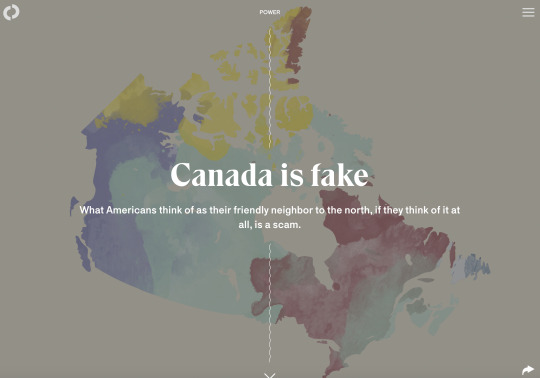
https://theoutline.com/post/8686/canada-is-fake?fbclid=IwAR2DRmPtIN3zJr9NIzcezZ1B9ztL_8flVNWf3HmsccD2Km6ORrpc-Jyg61Q&zd=2&zi=o4ix5hcx
I just returned home from a trip to New York, where everyone I met was very excited to meet a Canadian in real life. “What’s Canada like?” they asked, looking at me with eager, puppy eyes. “I think about moving there sometimes. What’s it like? What do you guys do there? Is it cold? Tell me everything.”
Americans don’t know much about Canada, and I don’t blame them. They live in the greatest country in the universe, apparently. The rest of the world is meant to plan itself around the U.S., rather than the other way around, and often that’s how things tend to go down anyway. Canada and the U.S. share the longest international border in the world, and yet, the average American could probably go their entire life knowing nothing really substantial about their northern neighbor beyond what they glean from Degrassi. When Americans do encounter Canada, it is usually in disguise — in movies and on TV, Toronto plays New York, Vancouver plays California, and presumably something else happens to the big empty space between those two cities (to its credit, Montreal can’t really play anywhere else, and Alberta hosts a lot of Westerns, but that’s about it). So I can forgive Americans for being clueless. I can forgive them their ignorance about this big, cold, confusing place just to the north of them. And that’s why I want to clear something up, once and for all, so I can put your minds at rest and save us all a lot of time and energy.
Here it is: Canada is fake.
Now, declaring a country “fake” is both a bold and boring statement. A lot of countries are fake, really; they all require a sort of collective willful suspension of disbelief. Patriotism feels a lot like being super into astrology — sure, you might not be hurting anyone, but don’t you think it’s a bit odd to be focused on what is essentially an accident of birth? So yes, maybe all countries are fake on some level. To achieve a collective identity among otherwise unaffiliated souls, most nation-states share the sort of commitment to the bit that Benedict Anderson, the scholar of nationalism, once described as an “imagined community.” The state itself is the best evidence we have for the claim that something can be both socially constructed and also terribly consequential — a border is an utterly unnatural thing, something that is so flimsy and nonsensical that states spend billions of dollars maintaining the illusion of their reality every year. Canada, the US, Australia, Belgium, etc. are all obviously unreal and also devastating in their real impact.
CANADA IS A SCAM — A PYRAMID SCHEME, A RUSE, A HEIST. CANADA IS A FRONT.
But when I say that Canada is fake, I don’t mean anything so universal or theoretical. Canada is not an accident or a work in progress or a thought experiment. I mean that Canada is a scam — a pyramid scheme, a ruse, a heist. Canada is a front. And it’s a front for a massive network of resource extraction companies, oil barons, and mining magnates.
If you’ve never attended a Canadian history class, here is the short version: European settlers spent their first years in this part of the continent hunting beavers en masse in order to turn their pelts into fancy hats. Founded through the fur trade, the Hudson’s Bay company operated as the de facto government in large portions of what is now Canada for nearly 200 years between 1670-1869. Private enterprises like these, with backing from the French and then the British governments, claimed larger and larger swathes of the continent to claim more and more fur, lumber, and ore, often directly stealing from and overpowering Indigenous trading systems that had been sustainably in place for thousands of years. Eventually they spread their land grab all the way to the Pacific Ocean and the northern coastlines in pursuit of gold, silver, iron, copper, nickel, and diamond reserves. The eventual formation of Canada as “Canada” came about in the late 1800s for nakedly economic reasons, primarily to benefit the companies and conglomerates that were trading Canadian natural resources with the British, but also to facilitate railroad construction (using slave labor) in which civic leaders had investments.
On some level, this history closely mirrors that of all colonial states. It’s a pattern that Marx once described as “primitive accumulation,” the principle economic drive of colonialism. Through the enclosure and seizure of resources, for the purposes of their privatization, entire populations and regions are brought into the scope of a ruling class which now owns the means of production and has the power to exploit workers with no choice but to accept the conditions forced upon them. So while Canada is not unique as a colony, it’s done a particularly poor job of adapting to its new status as a “country.” Canada lacks a cohesive identity or sense of itself as anything besides “not the US.” Our population is tiny, spread mostly along the southern border, and in most of the land mass — the parts claimed by “the crown” and private companies, and largely inhabited by Indigenous communities that have lived there since the beginning of human memory — anything resembling state services or essential infrastructure is few and far between. Even the few defining things we can claim as “Canadian,” like socialized medicine or pristine wilderness, are under threat by conservative politicians with an eye for privatization. The pattern of primitive accumulation continues.
This pattern lies at the heart of the shell corporation we call “Canada,” and forms the logic of both domestic and international policy. The mining industry is the most egregious example. Over 75 percent of the world’s mining companies are based in Canada. There’s some historical rationale here — the country was literally built on, around, and by the resource extraction industry. Still, this ridiculous preponderance is largely due to intentional moves by Canadian federal and provincial governments to attract mining money. For instance, mining companies can legally lay claim to minerals found underneath the ground basically anywhere in the province of Ontario, and in British Columbia, mining companies can stake claims on land without even having to be physically present.
Most of the physical geography of Canada is used for resource extraction purposes; nearly 90 percent of the land in Canada is “owned” by federal or provincial governments (41 percent and 48 percent, respectively), and most of that land is licensed out for private companies to use largely as they see fit. Maybe that’s why Canada is so reluctant to address its outsized role in global climate catastrophe, even though Canada is warming at twice the global average. And Canada has exported that environmental destruction elsewhere as well, because mining is effectively the basis of Canadian foreign policy. Canadian mining companies have free rein to devastate lands and communities in Central America and throughout Africa, and face virtually no consequences.
IN VIOLATING WET’SUWET’EN TERRITORIAL SOVEREIGNTY BY PUSHING THE COASTAL GASLINK PIPELINE AHEAD, CANADA IS CONTINUING ITS PRACTICE OF COLONIALISM AND PRIMITIVE ACCUMULATION.
The thing is, none of this is new. It’s only recently, though, that this fact has become impossible for Canadians to ignore. In January 2019, Canadian police descended upon the Unist’ot’en camp with snipers and chainsaws. Commanders of the iconically-Canadian Royal Canadian Mounted Police (RCMP) gave instructions to use “as much violence” as they want to confront members of the Wet’suwet’en nation — an Indigenous people whose territory lies directly in the path of a planned pipeline carrying natural gas from Alberta to the Pacific coast. The Wet’suwet’en set up the Unist’ot’en camp back in 2009, as a barricade against proposed pipelines set to cut through the region. In recent years, the camp has expanded to meet new threats, including those posed by a company called Coastal GasLink, backed by the RCMP, which aims to bulldoze through the territory to build a pipeline.
The lands in question are technically unceded, meaning that they lie fully outside of the jurisdiction of the Canadian state — this land was never officially incorporated into the Canadian state, and the people there never entered into formal treaties with Canadian colonists. In fact, as a 1997 Supreme Court case established, Indigenous land rights and title have never been extinguished in traditional Wet’suwet’en and Gitxsan territory, meaning that the lands rightfully ought to be governed by Indigenous laws, which the courts recognized as far predating any colonial presence in the region. It is, literally, not Canada. Still, Canadian police forced their way onto and through the land, violating Wet’suwet’en sovereignty and the demands of their political leaders, simply to privatize resources for colonial use and abuse.
In violating Wet’suwet’en territorial sovereignty by pushing the Coastal GasLink pipeline ahead, Canada is continuing its practice of colonialism and primitive accumulation. What’s more, Canada is violating international laws around military occupation and around the rights of Indigenous people. Right now, as I write this, members of Wet’suwet’en nation are still resisting, facing mass arrest and state violence, to protect their lands from privatization at the barrel of a gun. But for Canada, this is business as usual. The siege on Wet’suwet’en is a microcosm of what makes Canada “Canada.” The logic of resource extraction, led by private companies and enforced by the state, is what motivates Canadian policy and justifies Canadian national identity. Canada is three mining companies in a trench coat, wearing a stupid hat and carrying a gun.
Scratch the surface, and that’s all that’s underneath it. Canada is fake. But the consequences are real.
0 notes
Photo

BLOG POST #4
As a Social Work student, one of the most important things I’ve learnt throughout my schooling is knowing how to look at situations from an unbiased stand-point. To be a successful professional in this field is to be able to work with clients in a way that is engaging, respectful, and also open-minded. It’s a transferrable skill to be able to critically analyze the way people interact, how they behave, what sorts of outcomes/consequences will come of their actions, and what future steps can be taken in order to resolve a certain issue. So, with that being said, I found this class specifically interesting as it was a way for me to gain a general understanding of how people all around the world interact with one another, and how these interactions have positive or negative impacts on the general population.
A major reason that influenced me to take this class in the first place was to gain a sense of awareness of various international issues; each and every persons individual actions can have a significant impact on the rest of the world, and I was interested in learning about the ways in which globalization plays a role in, not only my personal life, but in my professional life, too. As I was reading the article “Mrs. May, we are all citizens of the world”, I came across a quote that resonated with me. It essentially said that, even though humans can be loyal to their own community, there is no fix-set of loyalty that an individual can have for both their own community and the global community divided (BBC, 2016). As a woman who is passionate about human rights, I can now see how globalization plays a significant factor in the prominence of patriarchal power struggles in countries all around the world, and yet how it also brings marginalized individuals together to voice their concerns and opinions in a much louder volume. I have had the opportunity to participate in several marches such as, Take Back the Night, the Wet’suwet’en march which took place earlier this year, Climate Change marches, Gay Pride marches, etc., and these are all perfect examples of events that have taken place all over the world. These events tackle both local discriminations and international discriminations, as every single catalyst for these marches is adamant in, literally, all countries on Earth. Opportunities such as these are moments of potential self-realization for participants as they can see for themselves that they are not the only people who are passionate and excited about pursuing the fight for International human rights. When we are able to bring together voices from all over the world, the power behind the message is far more effective.
For individuals around the world to feel a sense of social solidarity, there has to be a community in which they feel comfortable to be apart of. With cosmopolitanism being a worldwide ideology, those who are accepting of multiculturalism are able to connect with those around the world through social media with regards to global-empowerment of oppressed groups and communities. Though Mrs. May, the former Prime Minister of the U.K., exclaimed that there is no such thing as “a citizen of the world”, it is proven that every last one of us has a responsibility to keep one another safe (BBC, 2016). With such corruption occurring within our political powers, we all have to take on the role of “global citizens” to create a world for ourselves that can be true to the embracement of human diversity. Likewise to a quote in this news report, children are able to close their eyes and pretend as though nothing around them in existent (BBC, 2016). As much as it would be freeing for this to be true to reality, there is no stopping international issues if we simply pretend they are not there.
References:
BBC. (2016, October 29). 'Mrs May, we are all citizens of the world,' says philosopher. Retrieved from https://www.bbc.com/news/uk-politics-37788717.
0 notes
Text
#RadThursdays Roundup 06/13/2019

Two workers stand in front of a giant inflatable rat while participating in a strike in the snow. The cartoon rat has their front legs raised, claws out and teeth bared in a snarl. The inflatable rat, sometimes known as a “union rat”, are “commonly used in the United States by protesting or striking trade unions”. Source.
Issues
Old Neighbors, New Battles: "On Unist’ot’en territory in what some—for now—call British Columbia, a community has formed against police and industry incursions. The Unist’ot’en are the people of the headwaters, a house group within the Gilseyhu (big frog) clan of the Wet’suwet’en nation. Their land was never ceded or surrendered to colonial government—they made no treaties with the British Crown. For nearly 10 years, Unist’ot’en people have been reoccupying one of their traditional territories along the Wedzin Kwah (Morice River). Now, Coastal GasLink (CGL) is doing preconstruction work for their fracked-gas pipeline on the territory despite having received no consent from the Dinï ze’ and Ts’akë ze’ (highest hereditary chiefs) of the Wet’suwet’en people. The Unist’ot’en are facing a legal injunction against “occupying, obstructing, blocking, physically impeding or delaying access”to Coastal GasLink’s surveying and preconstruction work. Earlier this year, an access route controlled by the neighboring Gidimt’en clan was violently raided by militarized police enforcing the same injunction."
Between the Devil and the Green New Deal: “For now, a revolution is not on the horizon. We’re stuck between the devil and the green new deal and I can hardly blame anyone for committing themselves to the hope at hand rather than ambient despair. Perhaps work on legislative reforms will mean the difference between the unthinkable and the merely unbearable. But let’s not lie to each other.”

A giant inflatable cat wearing a suit jacket and tie clutches a construction worker in one hand and a money bag in the other. The boss cat smokes a cigar and looks down haughtily. Source.
Labor
Silvia Federici in Conversation with Astra Taylor: "Imagine the work that a woman does the first six, seven, eight months. All that work. Imagine billions of children. And they’re telling us that robots will be the end of work. It’s a very masculine view. And what happens to the earth? Where do the robots come from? How much more extractivism do we need? How many more people are we going to kill to make the robots? The robots don’t make themselves. Somebody makes the robots; somebody has to extract the minerals to make the robots. So who are they? Are they not human beings? So robots make robots?"
Workers With Disabilities Are Making Cents Per Hour — and It’s Legal: "Section 214(c) of the FLSA states that workers 'whose earning or productive capacity is impaired by age, physical or mental deficiency, or injury' can be paid based on their 'productivity' or on the 'quality and quantity' of their labor. The underlying assumption is that workers with disabilities are less valuable than workers without disabilities and should thus be paid based on their productivity to incentivize employers to hire them."
Colonialism is alive in the exploited tech work force: Companies like Facebook and Google continue to unfairly burden English-speaking workers abroad with their worst kinds of labor. "While social media users in the West peruse social media sites like Facebook and Instagram, we are largely unaware of the invisible chain of workers in the Global South who are subjected to excruciatingly violent, pornographic, and other disturbing content while being paid a fraction of U.S. wages."
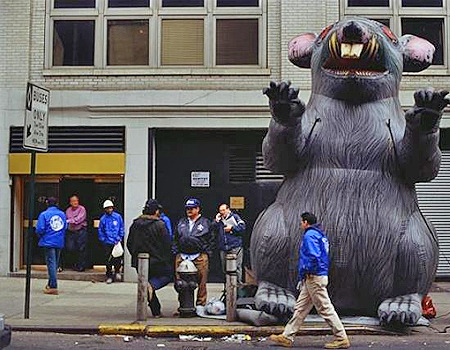
Workers talk and stand around a giant inflatable rat, which has red eyes, sharp teeth, and claws at the ready. Source.
Direct Action Item
Support the Unist’ot’en camp and the Gidimt’en access point.
If there’s something you’d like to see in next week’s #RT, please send us a message.
In solidarity!
What is direct action? Direct action means doing things yourself instead of petitioning authorities or relying on external institutions. It means taking matters into your own hands and not waiting to be empowered, because you are already powerful. A “direct action item” is a way to put your beliefs into practice every week.
1 note
·
View note